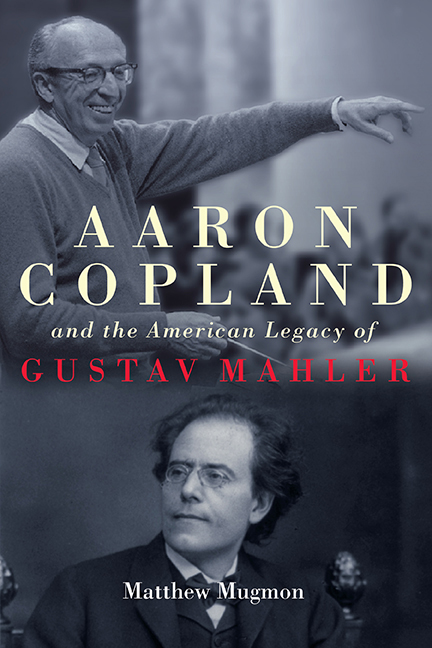Book contents
- Frontmatter
- Dedication
- Contents
- Acknowledgments
- Note on Musical Examples
- Introduction
- 1 Mahler and Copland in New York
- 2 Mahler in Nadia Boulanger's Studio and Beyond
- 3 Copland in Defense of Mahler
- 4 Mahler in Copland's Jewish Romanticism
- 5 Mahler's Idiom in Copland's “American” Sound
- 6 Copland, Koussevitzky, Mahler, and the Canon
- 7 Copland's Role in Bernstein's Mahler Advocacy
- Conclusion
- Notes
- Bibliography
- Index
- Eastman Studies in Music
5 - Mahler's Idiom in Copland's “American” Sound
Published online by Cambridge University Press: 18 September 2019
- Frontmatter
- Dedication
- Contents
- Acknowledgments
- Note on Musical Examples
- Introduction
- 1 Mahler and Copland in New York
- 2 Mahler in Nadia Boulanger's Studio and Beyond
- 3 Copland in Defense of Mahler
- 4 Mahler in Copland's Jewish Romanticism
- 5 Mahler's Idiom in Copland's “American” Sound
- 6 Copland, Koussevitzky, Mahler, and the Canon
- 7 Copland's Role in Bernstein's Mahler Advocacy
- Conclusion
- Notes
- Bibliography
- Index
- Eastman Studies in Music
Summary
That Aaron Copland, as a composer, owed a musical debt of some kind to Mahler is widely acknowledged. But the nature of that debt is only marginally understood. Commentators have long pointed out in general, and occasionally with some specificity, instances in which Copland seemed to draw on examples in Mahler's music for his own. Copland himself acknowledged such instances, noting, for example, that “Heart, We Will Forget Him” from the Dickinson Songs (1950)— which he called, strikingly, “the romantic fifth song”—“has been likened to Mahler.” (That piece is not discussed in detail in this study, but indeed its walking rhythm recalls “Nun will die Sonn’ so hell aufgeh'n” from Mahler's Kindertotenlieder, while its melody is strongly suggestive of both “Liebst du um Schönheit” and “Ich bin der Welt abhanden gekommen” from the Rückertlieder.) Copland's acknowledgment of Mahler here came despite his claim of “no direct influence” from Mahler in the Dickinson Songs; Copland granted that Mahler (along with Ives and Fauré in that collection) may have been “part of my working apparatus.”
As we have seen thus far, and as Copland's comment further attests, his advocacy of Mahler suggests that he had developed a complex musical relationship with Mahler's output, one that might manifest in his own music in profound ways. That relationship included ambivalent and often admiring commentary about Mahler as a romanticist or post-romanticist, suggesting that as a composer Copland was not interested in borrowing techniques to create an anti-romantic sound divorced from those techniques’ romantic context; on the contrary, he was using them, in part, to create his own aesthetic links with romanticism.
In fact, Copland adopted elements from Mahler that helped him define America musically, both in terms of romanticism and modernism. Ultimately, his personal response to Mahler shows the significant extent to which Mahler—whom Copland himself recognized as deeply tied to Austro-German romanticism—informed the same music that audiences continue to identify as quintessentially American.
The concluding section of Mahler's Das Lied von der Erde provides the clearest and most striking point of reference for Copland's own idiom from multiple standpoints, including orchestration, melody, harmony, and musical meaning.
- Type
- Chapter
- Information
- Aaron Copland and the American Legacy of Gustav Mahler , pp. 82 - 113Publisher: Boydell & BrewerPrint publication year: 2019



